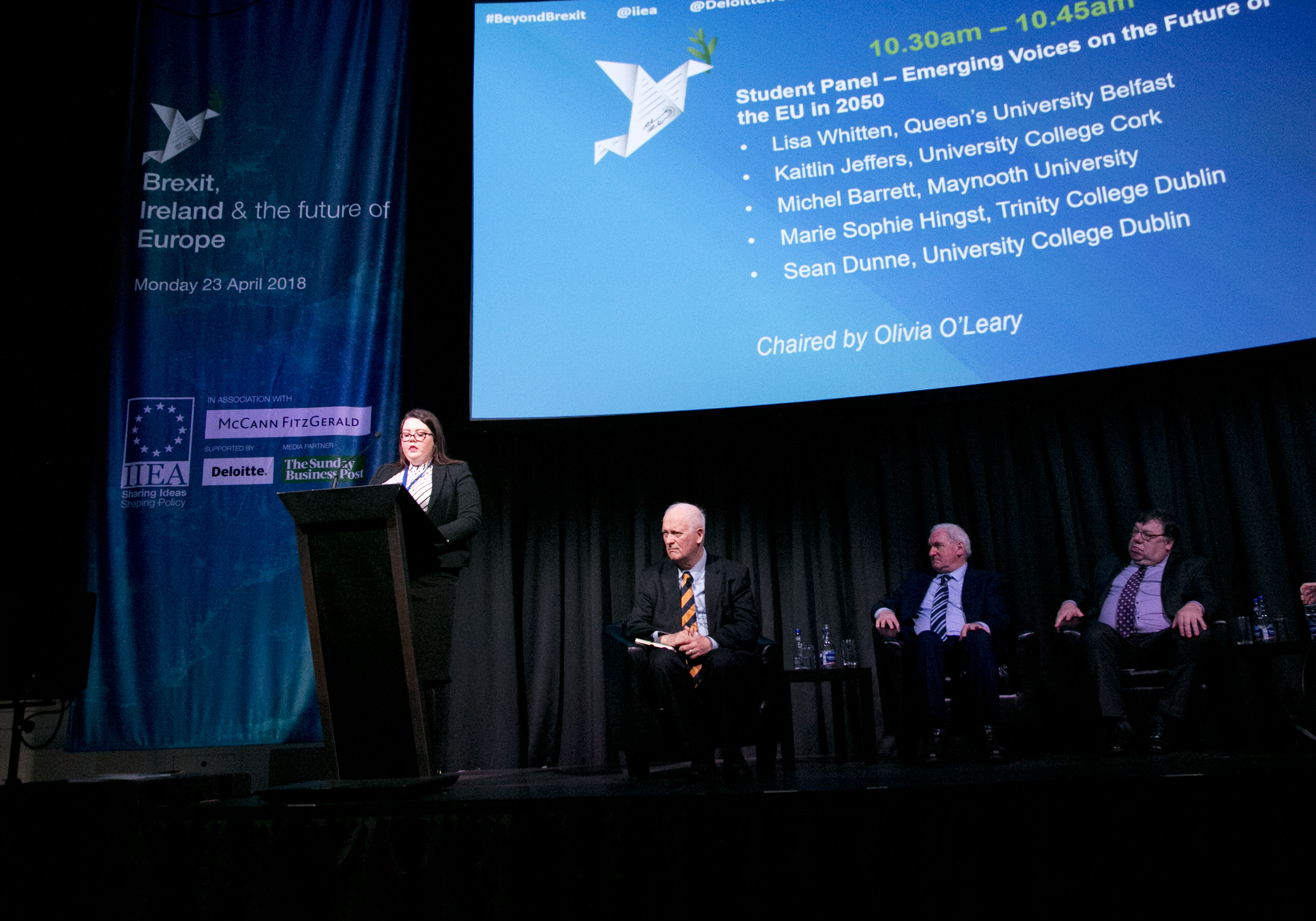In This Section
- Home
- About the Department
- Undergraduate Study
- Postgraduate Study
- Research
- Work Placement
- Our Staff
- Contact Us
- News
- Centre for Local and Regional Governance
- Archive
- Hub in Active European Citizenship
4th year BSc Government student, Kaitlin Jeffers, spoke at an event organised by the Institute for International and European Affairs (IIEA)

On Monday 23rd April, 4th year BSc Government student, Kaitlin Jeffers, spoke at an event organised by the Institute for International and European Affairs (IIEA). The conference on Brexit, Ireland and the Future of Europe saw Kaitlin deliver her vision for the future of Europe to a large audience in the Mansion House, Dublin. Taking place shortly after the 20th anniversary of the Good Friday Agreement, the event featured a conversation with former Taoisigh on the topic of the Northern Ireland peace settlement, and the role it has played in the Brexit negotiations. Subsequently, a panel of high level European speakers discussed the future of the EU without the United Kingdom.
Kaitlin was one of five students to contribute to proceedings and here’s her presentation:
‘Back to Basics
My vision for the European Union in 2050 is a braver European Union, a stronger actor on the international stage. By 2050 we will face new and different global threats in areas such as cybersecurity, climate change, economics, security and migration. The European Union of 2050 must, first and foremost, have the capacity to protect its citizens from these threats and to robustly represent the views and values of its member states on the international stage. The European Union needs to demonstrate collective strength and shared resolve in order to achieve that.
By strengthening its internal basis, by revisiting and respecting its core principles, the EU can be more outward-looking and be a greater force for good in today’s troubled world.
I believe that the European Union needs to go back to basics to achieve this, back to the original conception of the Union and the principles upon which it was founded. Namely, the Treaty of Rome and the four freedoms. Article 3 of the Treaty of Rome 1957 states that: “The activities of the Community shall include…the elimination, as between Member States, of…restrictions on the import and export of goods…; the abolition, as between Member States, of obstacles to freedom of movement for persons, services and capital” (European Union, 1957: 4).
Clearly, the four freedoms present different challenges to different member states. However, it is vital to the future success of the European Union that we strengthen these critical building blocks, to achieve a more cohesive union better able to develop and prosper in the future.
In the European Commission’s White Paper on the Future of Europe, Jean-Claude Junker says that it is time for us to “remind ourselves of the values that bind us together” (European Commission, 2017: 3). I agree with him. In my opinion, the unwillingness of member states to fully accept and implement all 4 freedoms has led to the weakening of the foundations of the European Union.
I wholeheartedly believe that my vision for the European Union in the year 2050; a braver, stronger actor on the international stage tackling the global threats of 2050, can be achieved. But it can only do this if the Union’s fundamentals are sound; if the EU goes back to basics.
As a young person in today’s Europe, my horizons are international. For the European Union to thrive, develop and meet future threats and challenges, it needs to adopt a similar outlook.
Going back to basics can help to shape a better future for me, for you, and for all of the citizens of Europe’.
Department of Government & Politics
Roinn Léann an Rialtais agus na Polaitíochta
Contact us
2nd Floor, Block B, O'Rahilly Building, University College Cork, Republic of Ireland,
